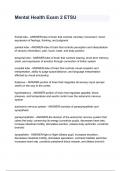Mental
Health
Exam
2
ETSU
frontal
lobe
-
ANSWER-lobe
of
brain
that
controls
voluntary
movement,
mood,
expression
of
feelings,
thinking,
and
judgment
parietal
lobe
-
ANSWER-lobe
of
brain
that
controls
perception
and
interpretation
of
sensory
information,
pain,
touch,
taste,
and
body
position
temporal
lobe
-
ANSWER-lobe
of
brain
that
controls
hearing,
short-term
memory,
smell,
and
expression
of
emotion
through
connection
of
limbic
system
occipital
lobe
-
ANSWER-lobe
of
brain
that
controls
visual
reception
and
interpretation,
ability
to
judge
space/distance,
and
language
interpretation
affected
by
visual
processing
thalamus
-
ANSWER-portion
of
brain
that
integrates
all
sensory
input
(except
smell)
on
the
way
to
the
cortex
hypothalamus
-
ANSWER-portion
of
brain
that
regulates
appetite,
blood
pressure,
and
temperature
and
exerts
control
over
the
autonomic
nervous
system
autonomic
nervous
system
-
ANSWER-consists
of
parasympathetic
and
sympathetic
parasympathetic
-
ANSWER-the
division
of
the
autonomic
nervous
system
that
calms
the
body,
conserving
its
energy
(constricts
pupils,
decreases
heart
rate,
increase
intestinal
motility,
stimulates
erection,
relaxes
body
sphincter,
constricts
bronchi)
sympathetic
-
ANSWER-fight
or
flight
(dilates
pupil,
increases
secretion,
decreases
intestinal
motility,
stimulates
ejaculation,
contracts
bladder
sphincter,
increases
heart
rate,
constricts
peripheral
blood
vessels,
and
dilates
bronchi) acetylcholine
-
ANSWER-functions
are
sleep,
pain
perception,
coordination
of
movement,
and
memory
increased
acetylcholine
-
ANSWER-depression
decreased
acetylcholine
-
ANSWER-parkinson's,
alzheimer's,
huntington's
norepinephrine
-
ANSWER-functions
are
mood,
cognition,
sleep,
perception,
and
cardiovascular
functioning
increased
norepinephrine
-
ANSWER-mania,
anxiety
states,
and
schizophrenia
decreased
norepinephrine
-
ANSWER-depression
dopamine
-
ANSWER-functions
are
movement
and
coordination,
emotions,
release
of
prolactin,
voluntary
judgment
increased
dopamine
-
ANSWER-mania
and
schizophrenia
decreased
dopamine
-
ANSWER-parkinson's
and
depression
serotonin
-
ANSWER-functions
are
sleep,
libido,
appetite,
mood,
aggression,
coordination,
and
judgment
increased
serotonin
-
ANSWER-anxiety
states
decreased
serotonin
-
ANSWER-depression
GABA
-
ANSWER-functions
to
slow
down
body
activity
decreased
GABA
-
ANSWER-huntington's,
anxiety
disorders,
schizophrenia,
and
various
forms
of
epilepsy
glutamate
-
ANSWER-functions
are
relaying
of
sensory
information,
regulation
of
various
motor
and
sensory
reflexes,
memory,
and
learning




